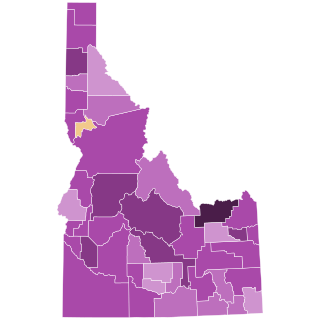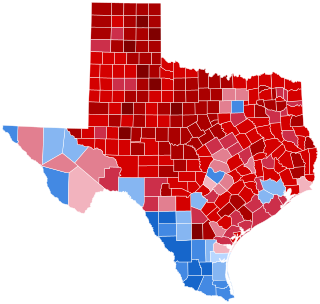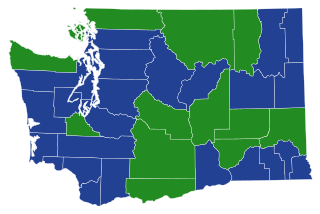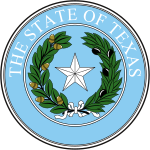
The Iowa caucuses are quadrennial electoral events for the Democratic and Republican parties in the U.S. state of Iowa. Unlike primary elections, where registered voters cast ballots at polling places on election day, Iowa caucuses are meetings where voters gather to discuss and select candidates for their registered party. Political parties hold the caucuses, in contrast to most state-run primaries. Both presidential and midterm elections in Iowa use caucuses. The caucuses are also held to select delegates to county conventions and party committees, among other party activities.

From January 3 to June 3, 2008, voters of the Democratic Party chose their nominee for president in the 2008 United States presidential election. Senator Barack Obama of Illinois was selected as the nominee, becoming the first African American to secure the presidential nomination of any major political party in the United States. However, due to a close race between Obama and Senator Hillary Clinton of New York, the contest remained competitive for longer than expected; neither candidate received enough pledged delegates from state primaries and caucuses to achieve a majority, without endorsements from unpledged delegates (superdelegates).

The 2008 Iowa Democratic presidential caucus occurred on January 3, and was the state caucuses of the Iowa Democratic Party. It was the first election for the Democrats of the 2008 presidential election. Also referred to as "the First in the Nation Caucus," it was the first election of the primary season on both the Democratic and Republican sides. Of the eight major Democratic presidential candidates, then-U.S. Senator Barack Obama of Illinois received the most votes and was ultimately declared the winner of the Iowa Democratic Caucus of 2008, making him the first African American to win the caucus and the first African American to win a primary state since Jesse Jackson in 1988. Former U.S. Senator John Edwards of North Carolina came in second place and then-U.S. Senator Hillary Clinton of New York finished third, though Clinton received more delegates than Edwards. Campaigning had begun as early as two years before the event.
This article contains the results of the 2008 Republican presidential primaries and caucuses.
The results of the 2008 Democratic Party presidential primaries are the detailed outcomes of a series of contests by which members of the United States Democratic Party chose their candidate for the 2008 U.S. presidential election. The contests are held in each of the fifty U.S. states, as well as the District of Columbia, Puerto Rico, American Samoa, Guam, the U.S. Virgin Islands, and Democrats Abroad. The Northern Mariana Islands was the lone U.S. state or territory which did not have a primary or caucus election in 2008. The outcomes include totals of delegates selected as well as popular votes.

The 2008 United States presidential election in Iowa took place on November 4, 2008, as part of the 2008 United States presidential election. Voters chose seven representatives, or electors to the Electoral College, who voted for president and vice president.

The 2008 Oklahoma Democratic presidential primary, part of the process of selecting that party's nominee for President of the United States, took place on February 5, one of the many nominating contests of 2008's "Super Tuesday". The primary election chose 38 pledged delegates to represent Oklahoma at the 2008 Democratic National Convention. The remainder of Oklahoma's 47 delegates consisted of unpledged superdelegates not bound by the results of the primary. The election was a closed primary, meaning that only registered Democrats could vote in this election. Hillary Clinton won the primary by a significant margin.

The 2008 Louisiana Republican presidential caucuses were held on January 22 and the primary on February 9, 2008.

The 2008 United States presidential election in California took place on November 4, 2008, in California as part of the 2008 United States presidential election. Voters chose 55 electors, the most out of any of the 50 states, to the Electoral College, who voted for president and vice president.

The 2008 Idaho Democratic presidential caucuses were held on Super Tuesday, February 5, 2008, with 18 national delegates at stake. For the first time, caucuses were held in all 44 counties, all of them open caucuses organized at the county level rather than the precinct level.

The 2008 Ohio Democratic presidential primary took place on March 4, 2008 and was open to anyone requesting a Democratic party ballot. In 2008, any registered Ohio voter could on election day request a primary ballot of either the Democratic or Republican party, by signing an affidavit stating that they supported the principles of the party whose ballot they are obtaining.

The 2008 Texas Democratic presidential primary and caucuses were a series of events to determine the delegates that the Texas Democratic Party sent to the 2008 Democratic National Convention. Delegates were selected using results from two sources: the Texas Presidential Primary held on March 4 by the Secretary of State of Texas's office, and a series of caucus events held between March 4 and June 7 by the Texas Democratic Party. The indecisive results of Super Tuesday, and the fact that Texas had the largest number of delegates among the states remaining on the Democratic primary calendar, resulted in the Texas primary receiving significant attention from both the Hillary Clinton and Barack Obama campaigns.

The 2008 United States presidential election in Washington took place on November 4, 2008, and was part of the 2008 United States presidential election. Voters chose 11 representatives, or electors to the Electoral College, who voted for president and vice president.

The 2012 United States presidential election in Louisiana took place on November 6, 2012, as part of the 2012 United States presidential election in which all 50 states plus the District of Columbia participated. Louisiana voters chose eight electors to represent them in the Electoral College via a popular vote pitting incumbent Democratic President Barack Obama and his running mate, Vice President Joe Biden, against Republican challenger and former Massachusetts Governor Mitt Romney and his running mate, Congressman Paul Ryan.

The 2008 United States presidential election in New Hampshire took place on November 4, 2008, as part of the 2008 United States presidential election throughout all 50 states and the District of Columbia. Voters chose four representatives, or electors to the Electoral College, who voted for president and vice president.

The 2016 United States presidential election in Texas took place on November 8, 2016, as part of the 2016 United States presidential election. Primary elections were held on March 1, 2016.

The 2020 Washington Democratic presidential primary took place on March 10, 2020, as one of several states voting the week after Super Tuesday in the Democratic Party primaries for the 2020 presidential election. The state-run semi-open primary, which was used instead of party-run caucuses for the first time by Washington's Democrats, awarded 109 delegates to the 2020 Democratic National Convention, of which 89 were pledged delegates allocated according to the results of the primary.

The 2020 Hawaii Democratic presidential primary had been scheduled to take place on April 4, 2020, a Saturday, in the Democratic Party primaries for the 2020 presidential election, but in-person voting was cancelled due to the COVID-19 pandemic and mail-in voting was extended to May 22, 2020. Instead, voters had until May 22 to submit mail-in ballots. The Hawaii primary was a closed party-run primary, awarding 33 delegates to the 2020 Democratic National Convention, of which 24 were pledged delegates allocated on the basis of the results of the primary. Voters cast ranked-choice voting ballots, with a voter's ballot counting for two ranked backup choices if their original choice was in last place and below the 15 percent threshold for winning delegates.

The 2020 Maryland Democratic presidential primary took place on June 2, 2020, after being rescheduled due to the COVID-19 pandemic, as one of eight delayed and regular primaries on the same day in the Democratic Party primaries for the 2020 presidential election. It was originally planned to take place on April 28, 2020, as one of several states in the "Acela primary". The Maryland primary was a closed primary, with the state awarding 120 delegates to the 2020 Democratic National Convention, of whom 96 were pledged delegates allocated on the basis of the primary results.

The 2020 Rhode Island Democratic presidential primary took place on June 2, 2020, after being postponed due to concerns about the coronavirus pandemic, as one of eight delayed and regular primaries on the same day in the Democratic Party primaries for the 2020 presidential election. It was originally planned to take place on April 28, 2020, as one of several northeastern states in the "Acela primary". The Rhode Island primary was a semi-closed primary, with the state awarding 35 delegates, of whom 26 were pledged delegates allocated on the basis of the primary results.




















